On Monday, the Washington Post made a mockery of President Obama’s correspondence with his military commander in Afghanistan when it published an “urgent, confidential assessment of the war” by Gen. Stanley A. McCrystal within hours after Obama indicated that he has yet to even receive it.
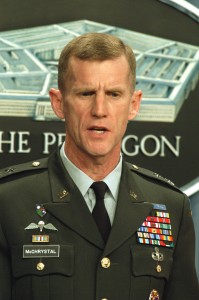 In any event, as is the case with most classified documents in Washington, the main points in this assessment came as no surprise. McCrystal, the top commander of US and NATO troops, states, among other things, that:
In any event, as is the case with most classified documents in Washington, the main points in this assessment came as no surprise. McCrystal, the top commander of US and NATO troops, states, among other things, that:
‘[W]ithout more forces and the rapid implementation of a genuine counterinsurgency strategy, defeat is likely…
‘The Taliban [is] a muscular and sophisticated enemy that uses modern propaganda and systematically reaches into Afghanistan’s prisons to recruit members and even plan operations [and]
‘[O]fficial corruption is as much of a threat as the insurgency … The weakness of state institutions, malign actions of power-brokers, widespread corruption and abuse of power by various officials, and [US/NATO’s] own errors, have given Afghans little reason to support their government [or to support this infernal and interminable war].’
Frankly, the only thing remarkable about McCrystal’s assessment is the extent to which it mirrors the assessment about the war in Iraq that Ayman al-Zawahiri, Osama bin Laden’s top lieutenant, made in letters US forces discovered last year.
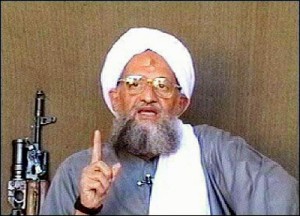 Most notably, like McCrystal, Zawahiri warned that the al Qaeda-led insurgency was suffering from a lack of adequate forces, a failure to execute an integrated strategy and sectarian infighting – all of which were “hurting the global jihadist effort and will ultimately impede the establishment of an Islamic state in Iraq.”
Most notably, like McCrystal, Zawahiri warned that the al Qaeda-led insurgency was suffering from a lack of adequate forces, a failure to execute an integrated strategy and sectarian infighting – all of which were “hurting the global jihadist effort and will ultimately impede the establishment of an Islamic state in Iraq.”
I fear, however, that, just as Zawahiri’s assessment did little to alter the course of al Qaeda’s defeat in Iraq, McCrystal’s assessment will do little to alter the course of the America’s defeat in Afghanistan. Even more sobering though is the pithy admonition former Secretary of State Colin Powell offered in this respect:
Think Iraq was hard? Afghanistan will be much, much harder.
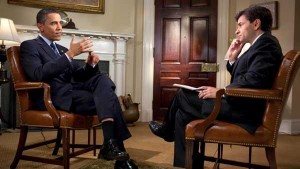 Meanwhile, to his credit, Obama is trying doggedly to shift the goal post in Afghanistan from nation building to “getting al Qaeda.” This, of course, would mean that instead of a surge in troops to emulate the strategy in Iraq, his new strategy would call for withdrawing most troops and relying on Special Forces and aerial drones to continue the hunt, which would clearly be more politically palatable.
Meanwhile, to his credit, Obama is trying doggedly to shift the goal post in Afghanistan from nation building to “getting al Qaeda.” This, of course, would mean that instead of a surge in troops to emulate the strategy in Iraq, his new strategy would call for withdrawing most troops and relying on Special Forces and aerial drones to continue the hunt, which would clearly be more politically palatable.
Nevertheless, I believe it will be deemed a military blunder of historic proportions that the US spent hundreds of billions of dollars and lost 4,326 lives over the past six years trying to build a nation in Iraq that “can govern itself, sustain itself and defend itself;” whereas, it should have deployed all of those resources in a more justified and meaningful effort to accomplish this objective in Afghanistan.
(Incidentally, this is why Obama was so prescient when he based his opposition to the war in Iraq on the fact that it was never a haven for terrorists and never posed a national security threat to the US.)
Anyone familiar with the derring-dos of Congressman Charlie Wilson, all of which are documented in Charlie Wilson’s War, will know that [in arming Taliban fighters] the Iranians are only doing to the Americans today what the Americans did to the Russians (when they were fighting an equally ill-fated war in Afghanistan for almost a decade during the 1980s).
[Iran arming America’s enemies in Afghanistan…, TIJ, September 10, 2009]
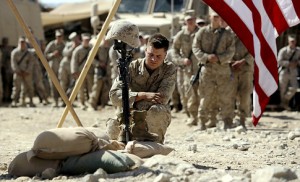 In any event, the irony is not lost on me that McCrystal’s grim assessment makes it woefully clear that nation building in Afghanistan (even under the guise of a “counterinsurgency strategy”) is no longer advisable or feasible. Indeed, all indications are that the die has been cast for this “good war.”
In any event, the irony is not lost on me that McCrystal’s grim assessment makes it woefully clear that nation building in Afghanistan (even under the guise of a “counterinsurgency strategy”) is no longer advisable or feasible. Indeed, all indications are that the die has been cast for this “good war.”
Accordingly, the US legacy there will be distinguished either by a terminally wounded national pride as American forces beat a hasty retreat in defeat (following the Russian precedent), or by tens of thousands of American soldiers being committed to Afghanistan’s “graveyard of empires” as it continues fighting this unwinnable war (following its own Vietnam precedent). And more troops only mean more sitting ducks for Taliban fighters.
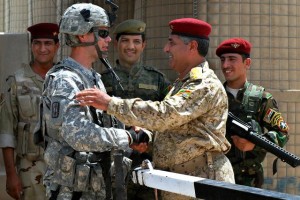 The US is fated to one of these shameful legacies in large measure because there will be no “awakening” among Afghans as there was among Iraqis, which compelled Sunnis to join coalition forces in Iraq to expel al Qaeda’s foreign fighters. And nothing militates against such an awakening quite like the fact that the overwhelming majority of Taliban fighters are native Afghans.
The US is fated to one of these shameful legacies in large measure because there will be no “awakening” among Afghans as there was among Iraqis, which compelled Sunnis to join coalition forces in Iraq to expel al Qaeda’s foreign fighters. And nothing militates against such an awakening quite like the fact that the overwhelming majority of Taliban fighters are native Afghans.
Moreover, other Afghans have no incentive to fight a war in which they appear to have no vested interest.
(By the way, for all intents and purposes, this is, and always have been, America’s war, which makes the notion that American forces are there to help Afghans fight for their own country a perverse and deadly form of national conceit.)
There is also the fact that the Taliban’s Sharia laws were not nearly as anathema in Afghanistan as al Qaeda’s jihadist ideology became in Iraq.
Not to mention the prevailing fallacy that America must wage war in Afghanistan because it (still) constitutes the central front in the war against al Qaeda. After all, for the past six years the Bush administration prosecuted the war in Iraq as if it was the central front in this war.
And there’s no denying that the last vestiges of al Qaeda are now so splintered that they are just as likely to be found in Pakistan, North Africa or, indeed, the United States.
Therefore, Obama would be well-advised to cut America’s losses and retreat ASAP; to let the Afghans govern themselves however they like; and to rely on Special Forces and aerial drones to get al Qaeda.
Related commentaries:
Iran arming…
Leave a Reply
You must be logged in to post a comment.